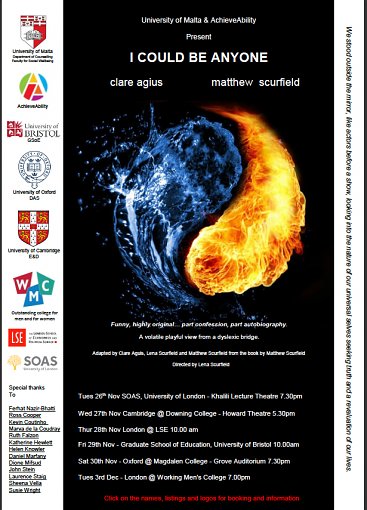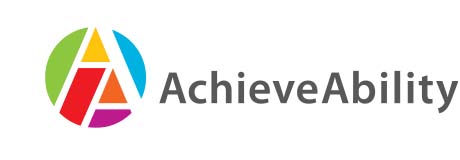Performance ethnography
Performance ethnography: Performance ethnography uses the idea of performance both as a method for practice and as a means for understanding.
Norman K. Denzin Ph.D., University of Iowa (Sociology)
I COULD BE ANYONE
Drama and Self-Esteem
Touring performances:
Tues 26th Nov SOAS, University of London - Khalili Lecture Theatre 7.30pm
Wed 27th Nov Cambridge @ Downing College - Howard Theatre 5.30pm
Thur 28th Nov London @ LSE
Fri 29th Nov Graduate School of Education, University of Bristol
Sat 30th Nov Oxford @ Magdalen College - Grove Auditorium 7.30pm
Tues 3rd Dec London @ Working Men's College 7.00pm
Please click on the PDF document below to then click on 'anyone' of the logos to book your ticket to your chosen event.
[pdf]
Given the curricular flagship of academic excellence, held up as the only way to survive the adult market place, dyslexia, or learning difference, is riddled with negative connotations. The experience of those whose needs stand out as being different at school, so often has clear and demonstrable damaging effects on their self-esteem and quality of life, particularly in adult years. These research findings are very eloquently brought to life through this autobiographical performance.
Having devised a piece of theatre, which sprang to life from the pages of a book I wrote about growing up as an undiagnosed dyslexic in the midst of academia, in post-war Cambridge, I started out by doing a couple of performances in Malta, with the Maltese actress and television presenter Clare Agius. Amongst the audience was Dr Ruth Falzon of the University of Malta, a diminutive force of nature, who found the piece powerful enough to invite us to do six consecutive shows at the University. Somewhat paradoxically for me, Ruth had set up these performances in conjunction with the dean of the Faculty of Education and the head of the Department of Psychology.
In acting out this autobiographical drama the crippling lack of esteem is revealed and purged. And when a good part of the audience is mixed in with those who have found their own way, despite the so-called learning disability they grapple with, or, if they're lucky, celebrate, a revealing debate kicks in. There were moments when individuals in the auditorium were so engaged they began expressing their own very personal stories. Without realising it, the audience was contributing and taking part in an aesthetic act within a theatrical tradition, performance ethnography.
When I COULD BE ANYONE played the DYSPLA festival in London 2011, the artist and teacher Katherine Hewlett and Dr Ross Cooper, from the charity AchievAbility, were inspired enough by what they saw to set up a showing at the House of Commons in Portcullis House, by way of the chairperson of AchievAbility Barry Sheerman MP. Thus began an encouraging and intriguing collaboration. Both Katherine and Ross have been instrumental in setting up the performance in the UK 2013.
Matthew Scurfield 2013
Norman K. Denzin Ph.D., University of Iowa (Sociology)
I COULD BE ANYONE
Drama and Self-Esteem
Touring performances:
Tues 26th Nov SOAS, University of London - Khalili Lecture Theatre 7.30pm
Wed 27th Nov Cambridge @ Downing College - Howard Theatre 5.30pm
Thur 28th Nov London @ LSE
Fri 29th Nov Graduate School of Education, University of Bristol
Sat 30th Nov Oxford @ Magdalen College - Grove Auditorium 7.30pm
Tues 3rd Dec London @ Working Men's College 7.00pm
Please click on the PDF document below to then click on 'anyone' of the logos to book your ticket to your chosen event.
[pdf]
Given the curricular flagship of academic excellence, held up as the only way to survive the adult market place, dyslexia, or learning difference, is riddled with negative connotations. The experience of those whose needs stand out as being different at school, so often has clear and demonstrable damaging effects on their self-esteem and quality of life, particularly in adult years. These research findings are very eloquently brought to life through this autobiographical performance.
Having devised a piece of theatre, which sprang to life from the pages of a book I wrote about growing up as an undiagnosed dyslexic in the midst of academia, in post-war Cambridge, I started out by doing a couple of performances in Malta, with the Maltese actress and television presenter Clare Agius. Amongst the audience was Dr Ruth Falzon of the University of Malta, a diminutive force of nature, who found the piece powerful enough to invite us to do six consecutive shows at the University. Somewhat paradoxically for me, Ruth had set up these performances in conjunction with the dean of the Faculty of Education and the head of the Department of Psychology.
In acting out this autobiographical drama the crippling lack of esteem is revealed and purged. And when a good part of the audience is mixed in with those who have found their own way, despite the so-called learning disability they grapple with, or, if they're lucky, celebrate, a revealing debate kicks in. There were moments when individuals in the auditorium were so engaged they began expressing their own very personal stories. Without realising it, the audience was contributing and taking part in an aesthetic act within a theatrical tradition, performance ethnography.
When I COULD BE ANYONE played the DYSPLA festival in London 2011, the artist and teacher Katherine Hewlett and Dr Ross Cooper, from the charity AchievAbility, were inspired enough by what they saw to set up a showing at the House of Commons in Portcullis House, by way of the chairperson of AchievAbility Barry Sheerman MP. Thus began an encouraging and intriguing collaboration. Both Katherine and Ross have been instrumental in setting up the performance in the UK 2013.
Matthew Scurfield 2013

